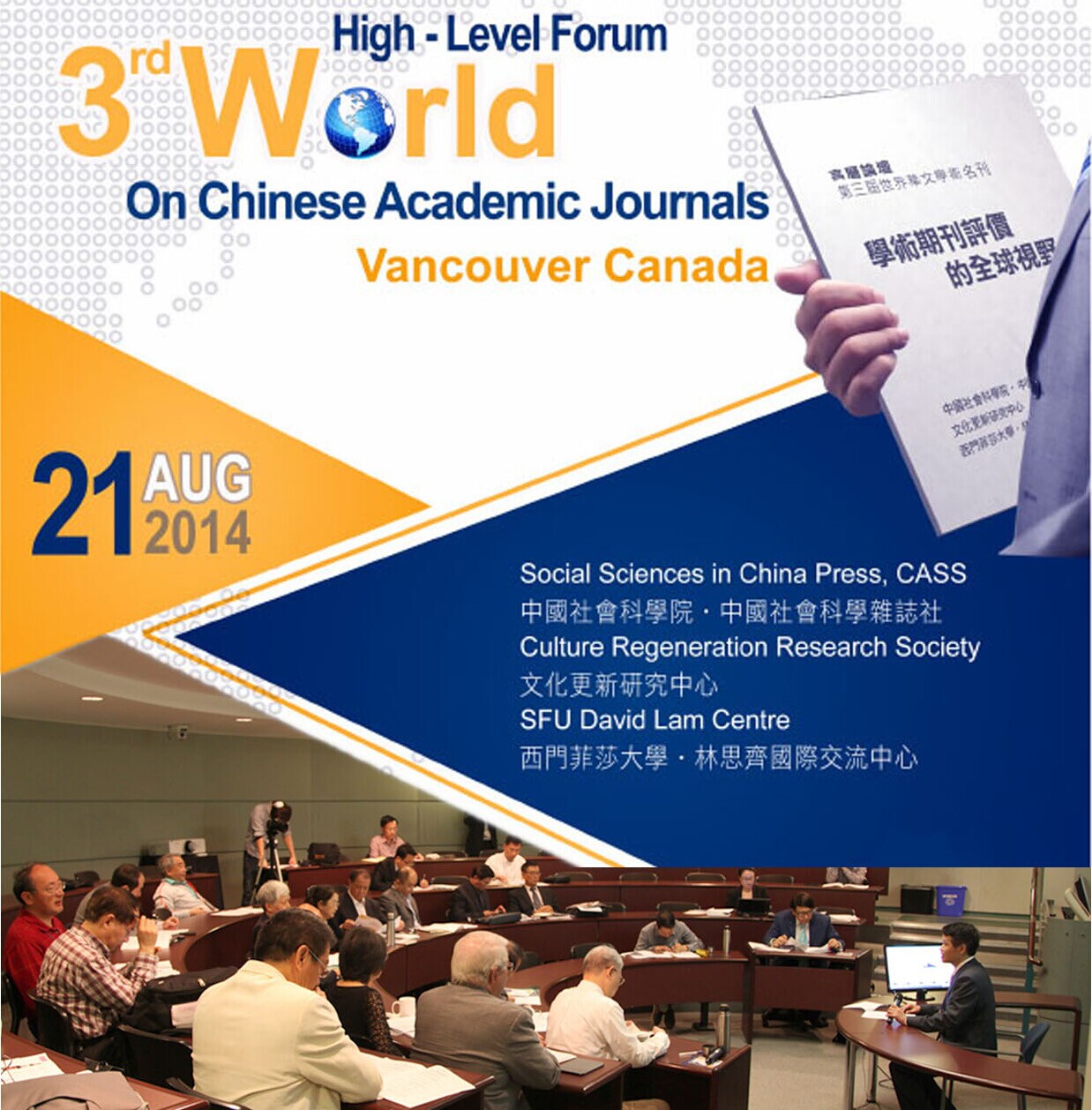Evaluation of journals raises bar for scholarship

VANCOUVER- With the theme “Innovation and Guidelines: Evaluation of Academic Journals in a Global Context,” the Third World High-level Forum on Leading Chinese Academic Journals was co-hosted by Social Sciences in China Press(SSCP) and the Culture Regeneration Research Society (CRRS) in Vancouver on Aug. 19. The forum was co-chaired by Yu Xinhua, deputy editor-in-chief of the SSCP and Liang Yancheng, director of the CRRS and editor-in-chief of Cultural China. More than 30 chief editors of leading Chinese academic journals from Canada, the United States, Singapore and China (including Mainland, Taiwan and Macao) were in attendance.
“Scholarly evaluation sets guidelines for academic research and serves the objective of scholarly journals,” Yu said in his speech. The authority of a scholarly journal is not defined solely by the publication of high-end, cutting-edged academic achievements. A journal must guide the direction of future academic research and constantly broaden the scope of study, Yu continued.
The purpose of the forum is to discuss the impact an evaluation system for journals can have on academic research, said Yu. With the establishment of evaluation criteria, Chinese journals should be able to deliver their voices among international scholarly community.
Overseas Chinese journals as a bridge
Liang Yancheng introduced the mission of their journal Cultural China in the keynote speech. He said the CRRS and its Cultural China celebrated their 20th anniversary this year with the goal of furthering their mission to objectively and fairly show an accurate picture of China to the Western world while better disseminating Chinese culture and improving the nation’s influence.
You Junhao, deputy director of the Chinese Language and Culture Center at Nanyang Technological University in Singapore, used The International Journal of Diasporic Chinese Studies as an example of how overseas Chinese academic journals are guided by a mission and philosoply as they work to promote research as well as how to follow an international pattern in the process of globalization. Wu Qixing, a professor from the UCLA School of Humanities, presented a comprehensive review of the development of Chinese media in North America from the mid- 19th century to the present, including five important transitions. Keeping pace with the rapid development of China, the Chinese media have shown an obvious trend, Wu said. Starting with small local Chinese newspapers, Chinese media over time began to draw increasing attention from the North American mainstream press. The Chinese media not only deliver information to the Chinese-speaking world in a timely manner but also present a more comprehensive picture of China to the world.
Building scholarly evaluation system
In the process of building a scholarly evaluation system, principles are of vital importance. Scholars summarized three principles: First, we adhere to the principle of understanding who we are and what we need. In response to internationalization, Chinese scholarly journals should not only simply copy international academic standards but also adopt scholarly evaluation systems in line with our own reality and evaluation criteria.
The second is to always have a clear understanding of the valuable traditions of Chinese academia because it springs forth from the same historical and cultural background. Common origins and shared aspirations for the future shall generate a clearer consciousness.
The third principle is to remain confident even as research lags behind. Academic development in today’s world is undergoing profound changes, providing an opportunity to catch up. We need to be adaptive and proactive in promoting suitable scholarly evaluation criteria and take advantage of innovations to effectively promote the development of the Chinese academic community. Some scholars have stressed that Chinese scholarly journals should take the responsibility to facilitate communication between scholars and readers, research and society, China and the world, the past and the future through scientific and effective evaluation activities with the goal of helping the Chinese-speaking world contribute more to the development of human civilization.
Meanwhile, scholars were highly interested in the efforts the Chinese Academy of Social Sciences (CASS) has made in establishing an academic evaluation system in China. Based on China’s experience and academic globalization as well as quantitative and qualitative evaluation, literature evaluation and social evaluation, these explorations greatly deepen our understanding of academic-centered principle and the role of theoretical guidance that academic journals should follow, scholars at the forum said. They said that they hope the process that began at the forum will be expanded to construct a Chinese evaluation system on philosophy and social sciences that is capable of effectively enriching and developing Chinese academia.
The World High-level Forum on Leading Chinese Academic Journals is an important annual philosophy and social sciences innovation project under SSCP. The first and second World High-level Forum on Leading Chinese Academic Journals were held in 2012 and 2013 in Moscow and Sydney, respectively, marking the beginning of global cooperation among Chinese scholarly journals as well as the establishment of an institutional mechanism for exchange and cooperation among Chinese scholarly journals worldwide.
The Chinese version appeared in Chinese Social Sciences Today, No. 638, Aug.25, 2014
The Chinese link is: http://www.cssn.cn/xspj/qkpj/201409/t20140903_1316182.shtml
Translated by Yang Xue
